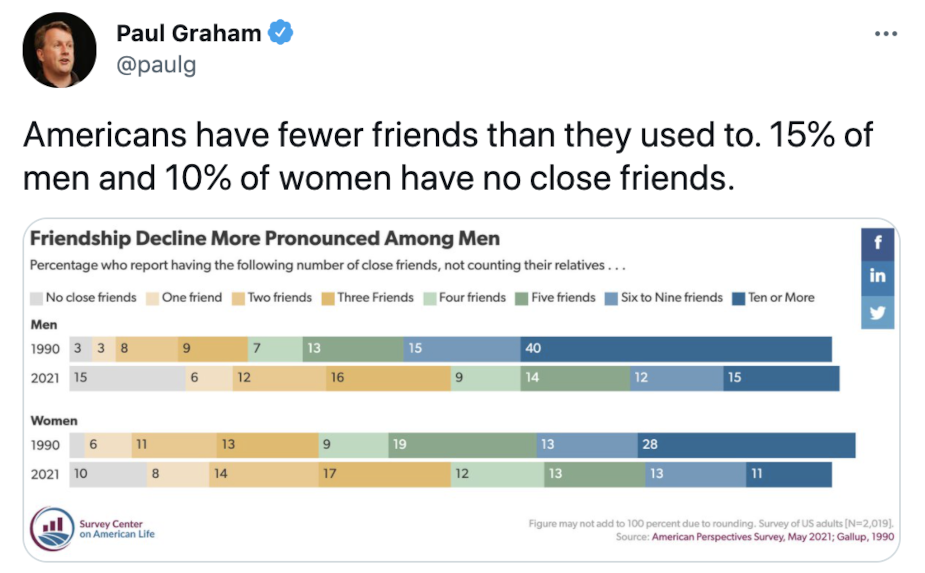
The Future of...Friendship: Why it’s Getting Harder Than Ever to Make and Keep a Friend

Making friends is hard. And keeping friends has become even harder. Research by YouGov in February found that many Britons now have fewer friends, with 18 per cent saying their close friend group has shrunk in the past year. 67 per cent of 25 to 49-year-olds said their friendships have suffered. Meanwhile, most people say they've become closer with their partner.
Thus The Independent recently declared that we’re going through ‘The Great Friendship Cull’ and The New York Times offered advice on ‘How to Rearrange Your Post-Pandemic ‘Friendscape’’. It seems that whilst many of us may have donned our rose-tinted spectacles for Friends: The Reunion, in reality, we’ve spent more time ghosting than hosting.
It’s easy to see why a series of unpredictable lockdowns have forced us to narrow our social fields. But there are other economic and technological factors driving us to hang out in smaller groups.
For example, many of us now work remotely, freelance or in the gig economy, and whilst that might expose us to more potential co-workers over time, it also means we’re less likely to bond easily with large groups of workmates in the long term. For many, gone are the days of working for decades with the same people in the same company, face-to-face, in large offices or workspaces.
Plus, the business of meeting new people in the first place has also become harder - and often downright weirder - thanks to technology.
Alongside social media, the rise of ‘Big Dating’ has driven people to become more transactional (and as a result, cautious) in their approach to relationship-building.
Indeed, two recently published books on the topic of online dating (Nothing Personal by Nancy Jo Sales and Available by Laura Friedman Williams) remind us that only a tenth of dating app users in the US have found a committed relationship according to Pew research and that more than half of young women have experienced some form of harassment.
The more people are able to manage their affairs at a distance, the more it appears they are becoming detached, actively lying or even becoming abusive. If this is how people behave when they’re looking for romance, how are they likely to behave when they’re just looking for a casual friend?

Image source: Twitter.com
As our friendship bases shrink, we are also becoming highly alert screeners - alive to the tricks and tactics of the fakers, scammers and potential ghosters.
Brands have long talked about building relationships, being loved or even just liked. So - now that getting people to let their guard down and let you in seems a pretty gargantuan task - how is a brand supposed to strike up a relationship with a potential customer, let alone keep them engaged?
Firstly, brands need to stop it with the hard sell. If people are interested, they can Google every aspect of your product or service (just like they can stalk a potential friend on social). Instead, you need to lead with some personality and human warmth. In this day and age, it’s almost shocking to hear someone communicate like they’re not a bot, a perfectly polished resumé or press release.
Second, you need to ditch the formality. If the pandemic has done anything positive for social interactions, it’s to bring us all down to earth and present us as equals in our own homes. To speak in a formal register and project oneself as a high-flying executive just seems laughable when we’ve all seen the insides of each other’s bedrooms already.
Third, spare everyone too much heart-wrenching earnestness. Yes, we are all hoping to emerge from this period of history as better people shaping a better world - but we don’t want to hear any more of the clichés of how in these ‘unprecedented times’ it is ‘now more than ever’ crucial to ‘pivot’ and get ready for the ‘new normal’. Are you changing careers? Great. Are you hoping to do better for the environment or mental health? Fantastic. Just remember: you’re not alone. Unless you want to be, that is.
Photo credit: Hannah Rodrigo on Unsplash












